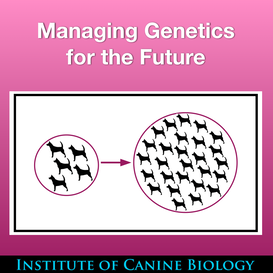But actually, heritability is a concept from population genetics. Heritability tells you how much of the variation in a trait in a group of dogs is the result of differences among them in their genes.
| Let me explain what I mean. Let's say you produce a litter of puppies that are all raised under exactly the same conditions, fed exactly the same way, given the same amount of exercise, and are treated exactly identically. If you did this (if you could do this), you could assume that any differences between the puppies in some trait would be entirely due to genetics, because they were not affected by any non-genetic, or "environmental", factors. In this population of puppies, we would know that all the differences in any trait in the puppies were entirely due to the particular genes each inherited from its parents. For a trait like weight at 1 month of age, we would know that any differences from puppy to puppy in weight were due to a slightly different combination of the many alleles that determine size in a dog. |
When you assess particular breeding combinations, you use whatever information you have about phenotype of the parents or relatives to make assumptions (or guesses, really) about the genes each parent is likely to pass on to each puppy. If the heritability of weight at 1 one month is 1.0, as for the first litter, you know that 100% of the variation in weight from pup to pup is due entirely to genetics. If you wanted smaller size in your next litter, you should keep one of the smaller puppies to breed and you should also get the genes for smaller size.
You can learn more about heritability and other tools for breeders in ICB's online courses.
ICB's online courses
***************************************
Visit our Facebook Groups
ICB Institute of Canine Biology
...the latest canine news and research
ICB Breeding for the Future
...the science of animal breeding



